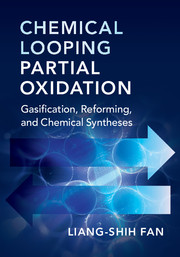Book contents
- Frontmatter
- Dedication
- Epigraph
- Contents
- In Cooperation with Professor Fan's Research Group Members
- Preface
- Nomenclature
- Abbreviations
- 1 Overview
- 2 Metal Oxide Oxygen Carriers
- 3 Oxidative Coupling of Methane
- 4 Syngas Generation
- 5 Catalytic Metal Oxides and Applications
- 6 Process Simulations and Techno-Economic Analyses
- Index
- Color plate section
2 - Metal Oxide Oxygen Carriers
Published online by Cambridge University Press: 07 November 2017
- Frontmatter
- Dedication
- Epigraph
- Contents
- In Cooperation with Professor Fan's Research Group Members
- Preface
- Nomenclature
- Abbreviations
- 1 Overview
- 2 Metal Oxide Oxygen Carriers
- 3 Oxidative Coupling of Methane
- 4 Syngas Generation
- 5 Catalytic Metal Oxides and Applications
- 6 Process Simulations and Techno-Economic Analyses
- Index
- Color plate section
Summary
Introduction
Partial oxidation of carbonaceous fuels in the chemical looping process uses metal oxide based oxygen carriers for the transfer of oxygen from air to the fuel. As discussed in Chapter 1, in a chemical looping partial oxidation (CLPO) process, oxygen carriers provide oxygen to partially oxidize the fuel in the fuel reactor or the reducer, thereby undergoing reduction themselves. The reduced oxygen carriers are then regenerated by air in the air reactor or the combustor and circulated back to the reducer. The oxidation reactions occurring in the combustor are highly exothermic and the heat generated can be used for power generation. The CLPO process thus generates separate streams of syngas or chemicals from the reducer and an O2-depleted flue gas from the combustor, which obviates many downstream processing steps for product generation.
Oxygen carrier materials play a key role in determining the product quality and process efficiency for a CLPO process. During reduction, the oxygen carrier donates the required amount of lattice oxygen for fuel conversion and product synthesis. In the oxidation step, the depleted oxygen carriers are replenished with oxygen from the air while heat is released, allowing for autothermal operation. Extensive research has been conducted into the design and development of optimum oxygen carrier materials. Oxygen carriers for successful chemical looping operation need to possess certain properties, like high oxygen carrying capacity, high fuel conversion, good redox reactivity, fast kinetics, good recyclability, long-term stability, high attrition resistance, good heat carrying capacity, high melting point, resistance to toxicity, and low production cost. In addition, the applications for partial oxidation require certain distinct oxygen carrier properties in order to accurately control product selectivity. Various materials have been studied for CLPO applications. During the early stages of development, single component materials were used as oxygen carriers. More recently, the development of oxygen carriers has been directed towards using multiple metal based composite materials as oxygen carriers for improved performance. While selecting oxygen carrier materials, an understanding of the underlying mechanisms helps in engineering particles with the desired qualities. The structural evolution and integrity of these particles during reaction has a direct implication on particle strength and reactivity. These, in turn, are governed by intrinsic ionic transfer mechanisms.
Some of the major challenges in the development of oxygen carriers include designing oxygen carriers with both good reactivity and good recyclability.
- Type
- Chapter
- Information
- Chemical Looping Partial OxidationGasification, Reforming, and Chemical Syntheses, pp. 55 - 171Publisher: Cambridge University PressPrint publication year: 2017



